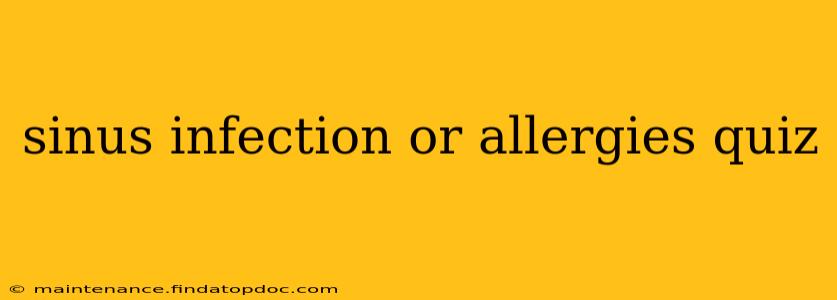Are you suffering from a stuffy nose, headache, and facial pressure? It's a common dilemma: is it a sinus infection (sinusitis) or allergies? Telling the difference can be tricky, as both share similar symptoms. This comprehensive guide will help you differentiate between the two, using a quiz and in-depth explanations to clarify the key distinctions. Understanding the root cause is crucial for effective treatment.
Take the Quiz: (Note: This quiz is for informational purposes only and does not replace a doctor's diagnosis.)
Answer the following questions with "Yes" or "No":
- Do you have a fever?
- Is your nasal discharge thick, green, yellow, or brown?
- Do you experience facial pain or pressure?
- Is your congestion accompanied by itchy eyes, nose, or throat?
- Do you have a cough?
- Have you experienced these symptoms for more than 10 days?
- Do you have a known allergy trigger (e.g., pollen, pet dander)?
- Do your symptoms improve with allergy medication (e.g., antihistamines)?
Scoring:
- Mostly "Yes" to questions 1-6 and "No" to 7-8: You are more likely to have a sinus infection.
- Mostly "Yes" to questions 4, 7, and 8, and "No" to 1-3, 5, and 6: You are more likely to have allergies.
- A mix of "Yes" and "No" answers: You may have a combination of allergies and a sinus infection, or another condition altogether. See a doctor for proper diagnosis.
Understanding the Differences: Sinus Infection vs. Allergies
Now let's delve into the details of each condition and address frequently asked questions.
What are the symptoms of a sinus infection?
Sinus infections, also known as sinusitis, are infections of the sinuses — air-filled spaces behind your forehead, cheeks, and nose. Symptoms typically include:
- Facial pain and pressure: This is a key differentiator from allergies. The pain is often felt in the forehead, cheeks, or around the eyes.
- Thick nasal discharge: The mucus is often yellow or green, indicating the presence of infection.
- Congestion: A stuffy nose is common.
- Fever: Fever is frequently present, especially in acute sinusitis.
- Cough: A persistent cough can accompany a sinus infection.
- Fatigue: Feeling tired and generally unwell.
What are the symptoms of allergies?
Allergies occur when your immune system overreacts to harmless substances (allergens) like pollen, dust mites, pet dander, or mold. Symptoms include:
- Itchy eyes, nose, and throat: This itching is a hallmark of allergies.
- Sneezing: Frequent sneezing is common.
- Runny nose: The nasal discharge is typically clear and watery.
- Congestion: While present, it's often less severe than in a sinus infection.
How long do sinus infections and allergies last?
- Sinus infections: Acute sinusitis typically lasts less than four weeks, while chronic sinusitis can persist for eight weeks or longer.
- Allergies: Allergic symptoms can be seasonal or year-round, depending on the allergen.
Can you get a sinus infection from allergies?
Yes, allergies can increase your risk of developing a sinus infection. Prolonged inflammation and congestion from allergies can create an environment where bacteria or viruses can thrive, leading to a secondary infection.
What is the best treatment for a sinus infection?
Treatment for sinusitis may include:
- Over-the-counter pain relievers: For pain and fever relief.
- Decongestants: To help clear nasal passages (use cautiously and as directed).
- Saline nasal spray: To help thin mucus.
- Antibiotics: Your doctor may prescribe antibiotics if the infection is bacterial.
What is the best treatment for allergies?
Allergy treatment options include:
- Antihistamines: To reduce allergy symptoms.
- Decongestants: To relieve nasal congestion.
- Nasal corticosteroids: To reduce inflammation.
- Allergy shots (immunotherapy): A long-term treatment option to desensitize you to allergens.
When should I see a doctor?
Consult a doctor if:
- Your symptoms are severe or don't improve after several days of home treatment.
- You have a high fever.
- You experience severe facial pain or pressure.
- You have other concerning symptoms.
This information is intended for educational purposes only and does not provide medical advice. Always consult a healthcare professional for diagnosis and treatment of any medical condition.
